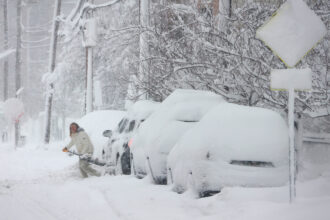CCS: Competitive Someday, Just Not Today (Wall Street Journal)
Harvard just released an analysis of the costs of carbon capture and storage for coal-fired plants. The findings: CCS could become an economically viable alternative source of energy down the road, but it’s a long road—and the short term isn’t pretty.
UK Carbon Trading System ‘Seriously Flawed’ (Guardian)
The system of trading carbon emissions at the heart of the UK’s ambitious low-carbon plan could allow so many "hot air" carbon credits that companies would not have to make any cuts to their own emissions until 2015, a new report says.
European Commission Seeks Oversight of Energy Investment (EurActiv)
The European Commission is proposing to increase monitoring of national energy infrastructure investments in key areas like biofuels, nuclear, gas and carbon storage to ensure enough is invested to meet future demand and climate targets.
Coal Slides as Renewables Top 11% of US Power Mix (Business Green)
As a raft of states pass new legislation demanding increased renewables capacity, new figures confirm green power now accounts for over 11 percent of U.S. energy.
Australia Opposition Signals It May Negotiate On Carbon Plan (Dow Jones)
Australia’s main opposition coalition signaled today it may be willing to negotiate over the proposed carbon trading scheme. It’s seeking changes that, if agreed by the government, could see the scheme passed into law when it is debated in Parliament next month.
Samsung to Invest $4.3 Billion in Green R&D (Reuters)
Samsung Electronics announced today it would invest $4.3 billion in green research and development and facilities to make the world’s largest memory chip maker a leading eco-friendly company by 2013.
UK Bank Launches Fund to Help Cree Tar Sands Lawsuit (Guardian)
People in the UK are being urged to support a legal fight by the Beaver Lake Cree Nation against the Canadian tar sands. Co-operative believes it is the "one of the last and best hopes" to stop new tar sands developments.
Most Australian Businesses Reducing Carbon Emissions (Bloomberg)
Some 74 percent of Australian companies have taken steps or plan measures in the next three years to manage their carbon footprint, a survey by the Australian Industry Group and KPMG finds.
Wind Power Fuels Political Fight in NC (Winston-Salem Journal)
North Carolina state senators are considering legislation that would effectively ban any large-scale generation of wind power in the mountains, citing aesthetics.
Study Finds Fish ‘Shrinking Due to Global Warming’ (AFP)
Fish have lost half their average body mass and smaller species are making up a larger proportion of European fish stocks as a result of global warming, a study has found.
At Risk from Rising Seas, Tuvalu Seeks Clean Power (Reuters)
The low-lying island state of Tuvalu has set a goal of a 100 percent renewable energy by 2020, hoping to set an example to industrialized nations to cut greenhouse gases it blames for rising sea levels.
Kennedy: How to End America’s Deadly Coal Addiction (Financial Times)
A revolution in natural gas production over the past two years has made it possible to eliminate most of the United Statese’ dependence on coal practically overnight – without the expense of new power plants, Robert F. Kennedy Jr. writes.
Climate Change Taking Toll on Glacier National Park (CNet)
Glacier National Park has become a living testament to climate change. In a place like this, the effects of climate change can be seen right before every visitor’s eyes.
About This Story
Perhaps you noticed: This story, like all the news we publish, is free to read. That’s because Inside Climate News is a 501c3 nonprofit organization. We do not charge a subscription fee, lock our news behind a paywall, or clutter our website with ads. We make our news on climate and the environment freely available to you and anyone who wants it.
That’s not all. We also share our news for free with scores of other media organizations around the country. Many of them can’t afford to do environmental journalism of their own. We’ve built bureaus from coast to coast to report local stories, collaborate with local newsrooms and co-publish articles so that this vital work is shared as widely as possible.
Two of us launched ICN in 2007. Six years later we earned a Pulitzer Prize for National Reporting, and now we run the oldest and largest dedicated climate newsroom in the nation. We tell the story in all its complexity. We hold polluters accountable. We expose environmental injustice. We debunk misinformation. We scrutinize solutions and inspire action.
Donations from readers like you fund every aspect of what we do. If you don’t already, will you support our ongoing work, our reporting on the biggest crisis facing our planet, and help us reach even more readers in more places?
Please take a moment to make a tax-deductible donation. Every one of them makes a difference.
Thank you,











